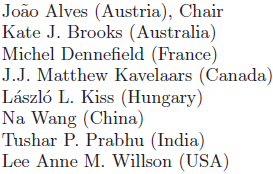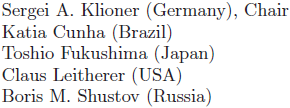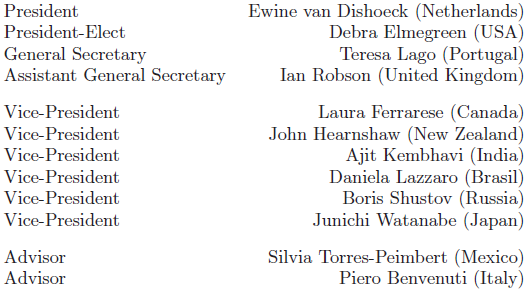1. Opening and Welcome
The President of the IAU, Dr. Silvia Torres-Peimbert, welcomed the delegates and members to the second business session of the General Assembly. The President invited the General Secretary, Dr. Piero Benvenuti, to start the business session. The agenda was approved.
2. Individual and Junior Membership
The General Secretary reported that, after screening by the Membership Committee, 1240 new members were accepted, including 888 Individual Members and 352 Junior Members. The list of new Members was projected on the screen. Chapter VIII presents the Report of the Membership Committee, including the lists of the names of Individual and Junior Members.
3. Honorary Members
For the first time, the IAU has Honorary Members. These are individuals that have substantially contributed to the development of astronomical research and culture in their country, who are not professional astronomers. They are nominated by National Members and approved by the Executive Committee. The first 9 Honorary Members proudly admitted at this General Assembly are:
-
Czech Republic:
 , Director, Brno Planetarium
, Director, Brno Planetarium Egypt: Hatem Hamdy Odah, President, National Research Institute of Astronomy and Geophysics
Ethiopia: Tefera Waluwa Wondimegegn, Deputy Prime Minister (2003–2010), Founder of Ethiopian Science Society
France: Christian Buil, Optical Senior Expert, CNES
Hungary: Attila Mizser, General Secretary, Hungarian Astronomical Society
Ireland: Joe Hogan, Open Telecom, Founder and CTO
Russia: Olga Y. Vasilyeva, Minister of Education and Science (2016)
Ukraine: Gordienko Sergey Pavlovich, Founder and Editor-in-chief of “The Universe, Space, and Time”
United States: Wayne Rosing, Chief engineer, Director, Las Cumbres Observatory
Their citations are available on https://www.iau.org/administration/membership/honorary/.
4. Deceased Members
The Executive Committee regretfully reported 348 deceased Individual Members of the Union, since August 2015. The list includes three former IAU Presidents, Yoshihide Kozai (1988–1991), Alexander A. Boyarchik (1991–1994), and Robert P. Kraft (1997–2000). The General Secretary displayed all of the names on slides, and the General Assembly observed a one-minute silence in their respectful memory. The complete list of deceased members is given in Chapter IX.
5. Appointment of the Official Tellers
The Official Tellers were duly appointed:
Rosa Duran (P)
Claus Leitherer (USA)
Denis Burgarella (F),
who confirmed that the quorum requirements for the National Representatives were satisfied.
6. Changes to Statutes and Bye-Laws
The revisions to the Statutes, as reported at the Business Meeting I, were approved; namely, to add new membership categories of Junior Member and Honorary Member, to remove time limits for Interim and Prospective (now changed to “Observer”) status, and to give detailed prescriptions in case of dissolution of the Union (necessary for obtaining the Charity Equivalency Status).
7. Resolutions
The Resolutions submitted to the General Assembly were examined by the Resolutions Committee, chaired by Bruce Elmegreen. One was “A” type, having to do with the administration of the IAU. Four were “B” type, i.e., with scientific content. They were submitted in English and published in the GA Newspaper before the vote. The French version was made available on the IAU web site after their adoption. The Resolutions are presented in their entirety in Chapter V.
As reported at Business Meeting I, these Resolutions were:
-
A1 on the IAU Strategic Plan 2020–2030
B1 on Geocentric and International Terrestrial Reference Systems and Frames
B2 on The Third Realization of the International Celestial Reference Frame
B3 on preservation, digitization and scientific exploration of historical astronomical data
B4 on a suggested renaming of the Hubble Law.
After discussion and clarifications, the first four Resolutions A1, B1, B2, and B3 were unanimously approved. Resolution B4 generated much discussion. Based on concerns expressed by members ahead of the General Assembly, the Executive Committee decided in advance that a straw poll would be taken at the General Assembly, (which indicated approval), but that there would be an electronic vote by the full IAU membership. Votes were accepted until Oct. 26, and the resolution was ultimately approved. In Chapter V, Resolutions Committee Chair Bruce Elmegreen details the discussion, questions, and answers leading up to the final vote.
8. Vote on proposal to modify Division F name
The Steering Committee of Division F, “Planetary Systems and Bioastronomy,” is proposing to modify the name of its Division to “Planetary Systems and Astrobiology.” Although the two terms “Bioastronomy” and “Astrobiology” can be considered synonyms, only the latter can be found in the most authoritative English Dictionaries as the most commonly used and correct term to indicate the field of science encompassing Astronomy and Biology concerned with the origin, early evolution, distribution and future of life in the universe. The Executive Committee, in its Meeting #99 (Pune, 2017), has endorsed the proposal that is now presented to the General Assembly for formal approval.
The proposed name change was approved by the Congress.
9. Elected Division Presidents and Vice-Presidents
The General Secretary presented the names of the Division Presidents and Vice-Presidents that were elected by the Members of their respective Divisions. The percentage of Division members voting ranged from 19% to 25%.
The new leaders are as follows:
Division A: Fundamental Astronomy
President: Daniel Hestroffer (France)
Vice-President: Norbert Zacharias (USA)
Division B: Facilities, Technologies, and Data Science
President: Michael Burton (Australia)
Vice-President: Gabriele Giovanni (Italy)
Division C: Education, Outreach, and Heritage
President: Susana Deustua (USA)
Vice-President: Richard de Grijs (Australia)
Division D: High Energy Phenomena and Fundamental Physics
President: Elena Pian (Italy)
Vice-President: Isabelle Grenier (France)
Division E: Sun and Heliosphere
President: Sarah Gibson (USA)
Vice-President: Cristina Mandrini (Argentina)
Division F: Planetary Systems and Bioastronomy
President: Gonzalo Tancredi (Uruguay)
Vice-President: Maria Antonella Barucci (France)
Division G: Stars and Stellar Physics
President: David Soderblom (USA)
Vice-President: Andrej Prsa (USA)
Division H: Interstellar Matter and Local Universe
President: Leonardo Testi (Italy)
Vice-President: Monica Rubio (Chile)
Division J: Galaxies and Cosmology
President: : Denis Burgarella (USA)
Vice-President: Kim-Vy Tran (Australia)
The Assembly took note.
10. Elected Commission Presidents
The General Secretary presented the names of the Commission Presidents who were elected by the Members of the respective Divisions.
A1: Jean Souchay (France)
A2: Florian Seitz (Germany)
A3: James Lindsay Hilton (United States)
A4: Alessandra Celletti (Italy)
X2: Giovanni B. Valsecchi (Italy)
B1: Dmitrij V. Bisikalo (Russian Federation)
B2: Anja C. Schröder (South Africa)
B3: Prajval Shastri (India)
B4: Anthony James Beasley (United States)
B5: Helen J. Fraser (United Kingdom)
B6: Antonio Mario Magalhaes (Brazil)
B7: Constance Elaine Walker (United States)
C1: Paulo Sergio Bretones (Brazil)
C2: Richard Tresch Fienberg (United States)
C3: Wayne Orchiston (Australia)
C4: Gudrun B. E. Wolfschmidt (Germany)
D1: Marica Branchesi (Italy)
X1: Christine Jones (United States)
E1: Alexander Kosovichev (United States)
E2: Paul Cally (Australia)
E3: Nicole Vilmer (France)
F1: Diego Janches (United States)
F2: Jack Lissauer (United States)
F3: Masatoshi Ohishi (Japan)
X2: Giovanni B. Valsecchi (Italy)
G1: Virginia Trimble (United States)
G2: Jorick S. Vink (United Kingdom)
G3: Marc Pinsonneault (United States)
G4: Jaymie Matthews (Canada)
G5: Carlos Allende Prieto (Spain)
H1: Dante Minniti (Chile)
H2: Edwin A. Bergin (United States)
H3: Albert Zijlstra (United Kingdom)
H4: Amanda Karakas (Australia)
J1: Cristina Carmen Popescu (United Kingdom)
J2: Valentina D’Odorico (Italy)
X1: Christine Jones (United States)
11. Financial Matters
Report of the Finance Committee, presented by João Alves (Chair)
The Finance Committee received the IAU Financial Projection for 2019–2021 on the 13th February and had a video conference a month later on the Projection. The Financial Report 2017, together with the Accounting Report 2017, the Audit Report, and the Special Audit Report reached the Committee on the 11th April. The Committee members have discussed the report via emails. They conclude that:
1) The projection for the next triennium is reasonable, and the Committee supports it.
2) The Financial Report presents details of financial transactions, a summary of the external auditing report, analyses of assets, incomes, and expenditures.
Details of the budget were given by General Secretary Piero Benvenuti, and tables are presented Chapter VI in this Volume).
The report was submitted to the vote of National Representatives, and the triennium budget proposal for 2018–2021 was approved.
12. Election of the Finance Committee
The General Assembly appointed the following Finance Committee (2018–2021):

13. Election of the Membership Committee
The General Assembly unanimously appointed the following Membership Committee (2018–2021):
David Soderblom (USA), Chair
![]() Ehlerová (Czech Republic)
Ehlerová (Czech Republic)
Laurent Eyer (Switzerland
Sofia Feltzing (Sweden)
William E. Harris (Canada)
Dibyendu Nandi (India)
Serena Viti (Netherlands)
14. Appointment of the Resolutions Committee
The General Assembly unanimously appointed the following Resolutions Committee (2018–2021):

15. Appointment of the Special Nominating Committee
The General Assembly unanimously appointed the following Special Nominating Committee (2018–2021):
-
Members:
-
Ewine van Dishoeck (President, Netherlands; Chair)
-
Jonathan Bland-Hawthorn (Australia)
-
Beatriz Elena García (Argentina)
-
Masahiko Hayashi (Japan)
-
Gražina Tautvaisiene (Lithuania)
-
Silvia Torres-Peimbert (Past President, Mexico)
-
Lidia van Driel-Gesztelyi (UK)
-
IAU Advisors:
-
Teresa Lago (General Secretary; Portugal)
Ian Robson (Assistant General Secretary; UK)
-
16. Election of the Executive Committee 2018–2021
The General Assembly unanimously appointed the following Executive Committee (2018–2021):

17. Special Executive Committee Award for Astronomy Outreach, Development, and Education
The IAU Strategic Plan (2020–2030) calls for the IAU to continue to enhance and diversify its portfolio of prizes to reflect changes in its priorities. The Executive Committee aims to have regular prizes in outreach, development and education. This special award is a first step, generously provided by incoming President Ewine van Dishoeck.
Ewine van Dishoeck:
The 2018 special prize is awarded on behalf of the IAU Executive Committee to Dr. Carolina Ödman, Associate Professor at the University at the Western Cape and Associate Director, Development & Outreach for the Inter-University Institute for Data Intensive Astronomy in South Africa, “for her pioneering work in astronomy outreach, development and education.”
During the last 15 years Carolina has used her unique combination of creativity, intelligence, pragmatism, and warm personal qualities to develop programmes that use astronomy to benefit society and humanity globally. Her accomplishments are many and unique.
She received an Astrophysics PhD in theoretical cosmology from Cambridge UK in 2003. Shortly thereafter, she joined Leiden University in 2005. Her task was to explore the possibility of initiating a new educational outreach programme, to inspire very young economically disadvantaged children with the beauty and size of the Universe. The idea of “Universe Awareness” was to use astronomy to help stimulate tolerance at a formative stage of a child’s development. As UNAWE International Project Manager from 2005 until 2010, Carolina turned Universe Awareness from an idea into a thriving international programme with a multidisciplinary network of hundreds of astronomers, teachers and outreach experts, operating in more than 40 countries, reaching more than 200,000 children in that period. It was a global cornerstone of the International Year of Astronomy. The success of UNAWE in these early years is in large part due to Dr. Ödman’s exceptional talents as well as her perseverance and hard work.
Shortly afterwards, she emigrated to South Africa, a country that has pioneered the use of astronomy as a tool for capacity building. She became Director of Academic Development at the AIMS Next Einstein Initiative at the African Institute for Mathematical Sciences in Cape Town. There she contributed substantially to the AIMS mission of giving bright young African scientists an opportunity to learn from some of the best lecturers around the world.
In 2013 Dr. Ödman became Chief Scientist at Thumzup, an innovative South African company that pioneers the development of new technology for consumers. Recently she re-joined the astronomical community as Associate Professor at the University of the Western Cape and Associate Director, Development & Outreach at the Inter-University Institute for Data Intensive Astronomy - a partnership of four South African universities.
It is clear that Carolina has been a pioneer in all aspects of education, outreach and development, and that she is a highly worthy recipient of this prize.
Unfortunately Carolina Ödman cannot be in Vienna to receive the prize in person, but it can be presented to her husband, Kevin Govender, the Director of the IAU Office of Astronomy for Development, to which she has also contributed her advice and energy.
18. Date and location of the XXXII General Assembly in 2024
It was announced that the XXXII General Assembly will take place in Cape Town, South Africa, in August, 2024. This will be the first time for a General Assembly to be held in Africa.



